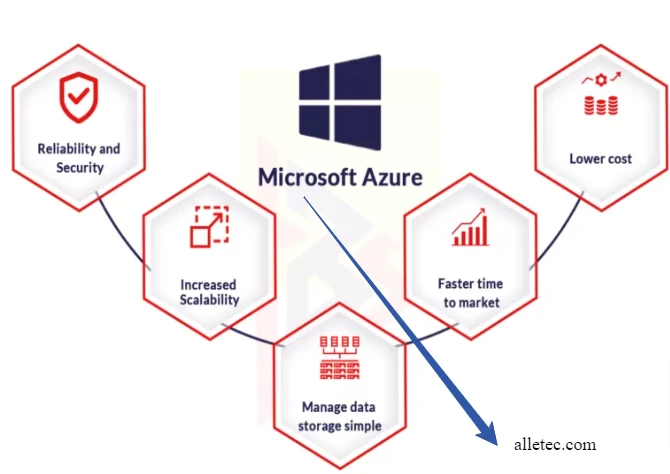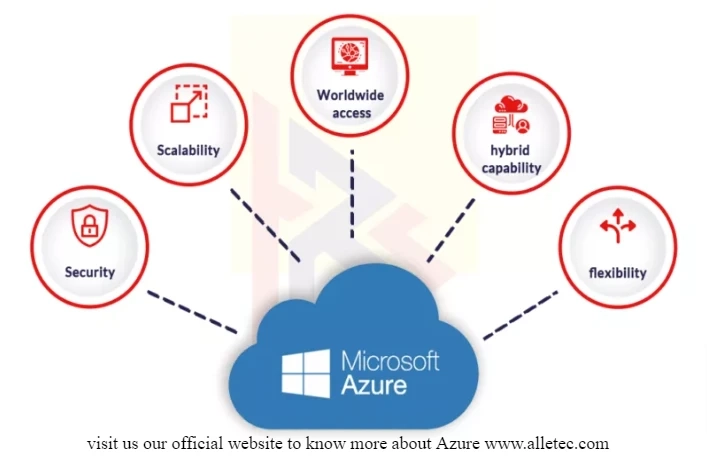Microsoft Azure offers a wide range of services that cater to the diverse needs of businesses and individuals. From computing and analytics to storage and networking, Azure provides a comprehensive suite of cloud solutions. In this article, we will explore some of the top Microsoft Azure services that are essential for anyone looking to harness the power of the cloud. Whether you are a developer, an IT professional, or a business owner, understanding these services is crucial in today\'s digital landscape. So, let\'s dive into the world of Azure and uncover the key services that you need to be aware of.
What is Microsoft Azure?
Microsoft Azure is a cloud computing platform and infrastructure created by Microsoft to build, deploy, and manage applications and services through Microsoft-managed data centers. Azure provides a wide range of integrated tools, pre-built services, and infrastructure that allows organizations and developers to quickly build, deploy, scale, and manage applications without having to build and maintain their  infrastructure. Some key Microsoft Azure services include computing, storage, databases, networking, analytics, machine learning, Internet of Things (IoT), security, DevOps, and more. With Azure, organizations can quickly build solutions while only paying for what they use, providing cost savings over traditional on-premises infrastructure. Azure aims to give developers and organizations the freedom to build, deploy, scale, and manage applications faster while focusing on the application logic and experiences.
infrastructure. Some key Microsoft Azure services include computing, storage, databases, networking, analytics, machine learning, Internet of Things (IoT), security, DevOps, and more. With Azure, organizations can quickly build solutions while only paying for what they use, providing cost savings over traditional on-premises infrastructure. Azure aims to give developers and organizations the freedom to build, deploy, scale, and manage applications faster while focusing on the application logic and experiences.
Why should you select Microsoft Azure Services?
Here are some of the key reasons why you should select Microsoft Azure services:
- Global Scale and Reach - Azure has more global regions than any other cloud provider, allowing you to deploy applications closer to your users around the world. This improves performance and redundancy.
- Hybrid Capabilities - Azure makes it easy for organizations to connect cloud applications to existing on-premises infrastructure. This allows you to migrate to the cloud at your own pace.
- Security and Compliance - Azure provides robust security at both the infrastructure and platform level, offering tools to manage security and compliance across applications and data. Azure complies with major standards like ISO, PCI DSS, and HIPAA.
- Comprehensive Platform - With hundreds of services spanning computing, storage, databases, analytics, machine learning, IoT, and more, Azure offers a very wide range of integrated cloud services to build sophisticated solutions.
- Developer Productivity - Azure offers excellent support for open-source platforms and languages like .NET, Java, Python, and Node.js that allow developers to use their existing skills. Integrated tooling improves productivity.
- Flexible Pricing Options - Azure offers multiple pricing options like pay-as-you-go, spot instances, and reserved capacity so you can optimize costs based on your budget and workloads. Scalability allows you to pay for only what you use.
In summary, Azure provides global, secure, and compliant cloud services with flexible pricing models, allowing organizations to innovate faster while optimizing infrastructure costs.
Different Microsoft Azure Services:
Microsoft Azure is setting the right course to compete with other industry players. Its accelerated development enables businesses to rapidly deploy new and popular cloud services.
- Virtual Machine
Virtual machines play a critical role when running high-performance applications and managing workloads. This is one of the most critical Azure services for business migration and data encryption. It enables you to quickly build virtual machines with either Windows or Linux. You can keep your data secure while complying with regulations on multiple VM instances. Azure also offers per-second billing, making this service even more desirable. Azure provides various types of optimized virtual machines, including computer-, memory-, and general-purpose machines.
2. Azure DevOps:
Azure DevOps assists in improved planning and collaboration for Azure development. As one of the first cloud services in the market, Azure DevOps makes it easier to plan, monitor, and collaborate on work. Azure Pipelines streamlines building, testing, and deploying software through CI/CD. Azure Test Plan enables testing and shipping, while Azure Artifacts allows sharing packages with teams. Azure Repos helps create better code through advanced file management and pull requests. In summary, Azure DevOps enables better collaboration and faster results, making it an ideal service for development teams.
3. Azure Cosmos DB:
Azure Cosmos DB is a full-featured NoSQL database service that provides single-digit millisecond response times globally. Many businesses rely on Azure Cosmos DB for fast writes and reads worldwide. With its SQL and Cassandra APIs, Azure Cosmos DB features enterprise-level security and is an ideal platform for quickly developing applications. Azure Cosmos DB delivers instant and unlimited elasticity through automatic scaling. It also enables real-time business insights.
4. Azure Active Directory:
Azure Active Directory is an essential service to learn for Azure careers. It simplifies user ID and password administration while creating a seamless environment for administrators. Azure Active Directory is known for providing multifactor authentication to protect businesses from identity theft. It enables users to securely access applications from anywhere.
5. Azure Content Delivery Network:
Azure Content Delivery Network (CDN) accelerates business growth by ensuring fast, secure global content delivery. Integrating with Azure services like storage, web apps, and cloud services, Azure CDN reduces load times for a fast, responsive customer experience. This developer-friendly content delivery network provides robust security to minimize and eliminate threats. It also translates granular customer workflows into tangible, actionable engagement insights.
6. Azure Backup
Azure Backup is a popular service for backing up on-premises data to the cloud. The One-Click Backup enables easy, encrypted backups of SQL and virtual machines to protect sensitive data. Azure Backup maintains consistency between Linux and Windows applications. Through its central backup portal, it fully automates and manages the backup process.
Conclusion
Microsoft Azure offers a continually expanding array of services that enable organizations to innovate quickly without managing infrastructure. Key services like Azure Virtual Machines, Azure Storage, Azure Cosmos DB, and Azure DevOps provide the core functionality for computing, databases, storage, and development tools. Additional services create capabilities around containers, the Internet of Things, AI, serverless computing, and much more.
When evaluating Azure services, organizations should assess their business needs and technology roadmaps. Factors like scale, security, compliance, integration, ease of use, and cost should guide the selection process. Adopting the hybrid approach by connecting Azure with existing on-premises infrastructure can make migration smooth.
As Microsoft rapidly innovates new Azure offerings, staying up to date is crucial. Overall, with hundreds of cloud-based services backed by enterprise-grade security and global scale, Azure gives organizations the flexibility and support to accelerate innovation while optimizing their IT assets and budgets. Leveraging the multitude of Azure solutions will drive growth and efficiency well into the future.


